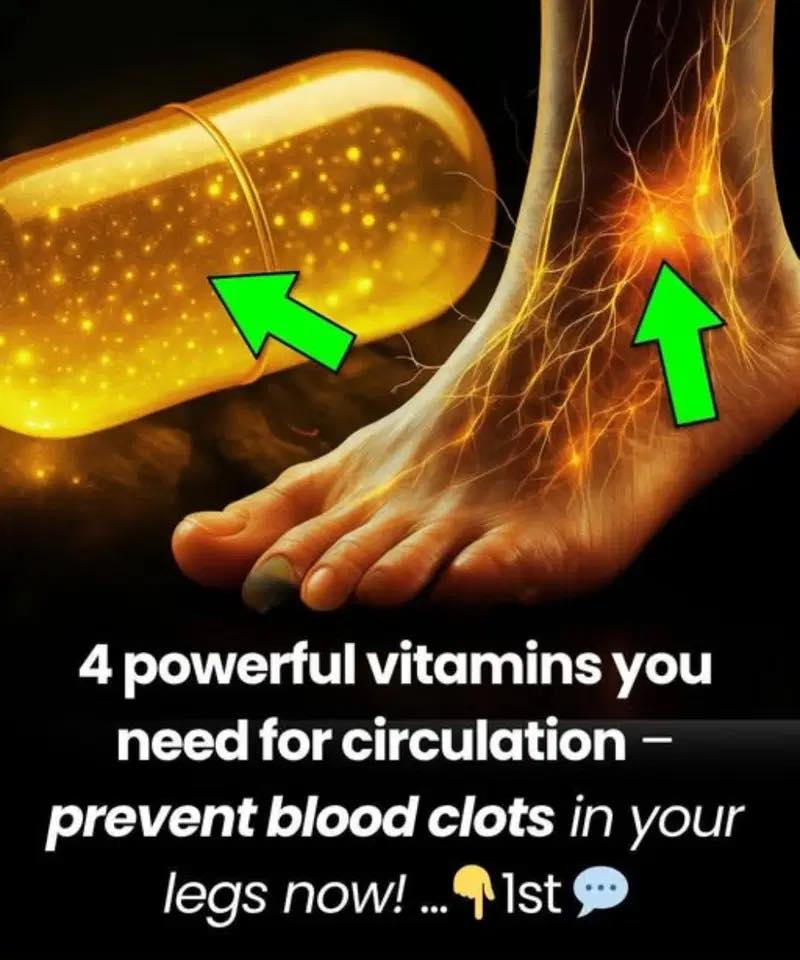
Are Your Legs or Feet Cold, Numb, or Heavy? It Could Be Poor Circulation — Not Just Aging
Do your legs or feet often feel cold, tingly, or heavy? Do you struggle with leg cramps while walking, have slow-healing wounds, or notice bulging veins? These may seem like common signs of getting older, but they could actually indicate poor circulation.
Why Circulation Matters
Healthy blood flow is essential. It delivers oxygen and nutrients to your muscles, nerves, and skin. When that flow is disrupted, it can lead to discomfort, visible vein issues, or even serious vascular conditions like narrowed arteries.
The good news? Supporting circulation is possible — and certain nutrients, especially four key vitamins, can help strengthen blood vessels and keep your blood flowing smoothly.
5 Common Signs of Poor Circulation
Before addressing solutions, here are some early warning signs your circulation might need support:
1. Tingling or Numbness in Legs and Feet
If your feet or legs frequently “fall asleep,” it could mean your nerves aren’t getting enough oxygen due to poor blood flow.
2. Cold Feet — Even Indoors
Constantly cold toes, even when you’re warm, may indicate reduced circulation to your extremities.
3. Leg Cramps During Movement
Sharp, painful cramps while walking — especially in your calves — could be a sign that narrowed arteries are limiting oxygen delivery.
4. Discolored or Patchy Skin
Skin that appears pale, bluish, reddish, or has dark patches (especially around the ankles) might signal restricted blood flow.
5. Varicose or Spider Veins
Twisted, bulging veins near the skin’s surface may reflect a struggling circulatory system.
4 Vitamins That Support Healthy Circulation
The following vitamins play a powerful role in boosting blood flow and protecting your vascular system — especially in the legs and feet.
1. Vitamin B3 (Niacin) – Clears and Relaxes Arteries
Niacin improves blood flow by relaxing blood vessels and reducing cholesterol buildup.
- Benefits:
- Lowers LDL (“bad”) cholesterol
- Raises HDL (“good”) cholesterol
- Reduces plaque and clot formation
- Sources: Chicken, salmon, eggs, almonds, brown rice
- Tip: Aim for 14–16 mg daily from food. Use high-dose supplements only with medical supervision.
2. Vitamin C – Strengthens Blood Vessel Walls
Vitamin C is key for collagen production, which helps keep blood vessels strong and flexible.
- Benefits:
- Strengthens veins and arteries
- Supports faster wound healing
- Reduces visible varicose veins
- Protects vessels from oxidative damage
- Sources: Citrus fruits, bell peppers, strawberries, broccoli, kiwi
3. Vitamin K – Balances Clotting and Prevents Artery Hardening
Vitamin K, especially K2, helps regulate blood clotting and prevents calcium buildup in arteries.
- Benefits:
- Promotes healthy clotting
- Prevents stiff, hardened arteries
- Improves vessel flexibility
- Sources:
- K1: Leafy greens like kale, spinach, parsley
- K2: Fermented foods, aged cheeses, egg yolks, liver
4. Vitamin E – Shields and Supports Arteries
As a powerful antioxidant, vitamin E helps keep blood vessels healthy and clear.
- Benefits:
- Protects artery walls from damage
- Reduces risk of clots
- Enhances nitric oxide, helping vessels relax and widen
- Improves oxygen delivery in small capillaries
- Sources: Almonds, sunflower seeds, avocados, olive oil, spinach
Final Thoughts
If you’re noticing symptoms like numbness, cold feet, cramps, or visible veins, your body may be signaling poor circulation. Supporting your vascular health with the right vitamins — B3, C, K, and E — can help improve blood flow and prevent further issues.
Focus on a diet rich in these nutrients and consult a healthcare provider before starting any new supplements.


